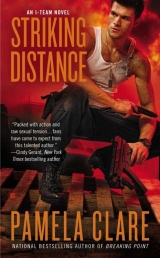
Текст книги "Striking Distance"
Автор книги: Pamela Clare
сообщить о нарушении
Текущая страница: 8 (всего у книги 23 страниц)
Judging from his expression, Tom didn’t like this. “I want the bombing on the front page every day until it’s resolved. Some asshole tried to take out one of my reporters and damned near killed the entire I-Team staff. What about an interview with the kid’s parents?”
“I’ve called four times. I’ll try again.” Alex sounded irritated.
Then Tom looked directly at Laura. “Are you privy to any info the feds haven’t felt like sharing with the public?”
Laura stiffened. “No. I haven’t spoken with anyone from the FBI or the Marshal Service since last week.”
Surely Tom realized she couldn’t share information from an active investigation just because she worked for the paper.
His gaze shifted back to Alex. “Get me something—an interview with a source close to the investigation, the kid’s parents, witnesses. I want at least ten inches on this, enough for a decent headline.”
“Whatever you say.” Alex was definitely irritated. “There was a gang-related killing in the state pen overnight. The suspected head of one of the Mexican nationalist gangs was found dead in his cell this morning with his throat slit. Word is that the head of the white supremacist group green-lighted the murder from his cell in D-seg. I’d like to report this—maybe ten inches—and use it as a springboard for a bigger piece about gangs in Colorado prisons.”
While Tom and Alex discussed possible angles for Alex’s proposed story, Laura looked over her notes, knowing it was almost her turn in the hot seat. She heard footsteps and looked up to see Javier. Her breath caught, her mind going blank. He stood in her office doorway wearing nothing but a towel. In the sauna, seeing him dressed like this had been one thing. But seeing him standing in her office, daylight highlighting his muscles, making his dark skin gleam . . .
“Can I use your washer?” he asked quietly.
She nodded, unable to keep from raking him with her gaze.
“Nilsson, you there?” Tom looked into the computer screen.
“Yes.” Laura glanced down at her notes. “I need to finish my interview with Ted Hollis, the man I was speaking with when the bomb went off. I’ve got two more soldiers I’d like to interview after that. I’m slated to talk to the local coordinator for the VA’s PTSD program tomorrow. I’d like to talk to the regional VA director, as well, but he keeps shunting me over to the PR flack. I hope to have a story by Friday.”
Laura glanced back over her shoulder, but Javier was gone.
* * *
MCBRIDE SHOWED UP with Callahan at fifteen hundred hours to brief Laura on the investigation. Javier could tell the man was pissed. So was he.
“I’ve never known the Marshal Service to back down like this. Tower must have powerful friends in Washington. He also has an alibi. A friend of his claims he was in D.C. at the time the bomb went off. I’m sure it’s false, but I can’t prove that. He came in voluntarily and answered our questions, even offered to help, which makes him look good. Officially, he’s no longer a person of interest in this case, but unofficially . . .”
Laura nodded. “I understand.”
Javier stood to her right, the tension inside him making it impossible for him to sit. “What about all the phone calls, the way he followed her to her car? What about the bruises he left on her wrists?”
McBride didn’t seem to take Javier’s frustration personally. “The district attorney has declined to prosecute the case. He bought into Tower’s claim that Tower would never have touched Laura if she hadn’t held a gun on him. He says one incident of following Laura to her car doesn’t constitute stalking. But if Tower continues to call you or comes near you again, Laura, we’ll arrest the son of a bitch and charge him with violating the restraining order. He won’t be able to squirm out of that.”
The order, signed by a judge on his lunch hour, thanks to Laura’s very determined attorney, sat on Laura’s coffee table beside half-empty coffee cups.
Tower was making the most of his fifteen minutes of fame to repeat his lies about her being to blame in some way for her own abduction and the deaths of his men, and this time some of the papers had taken the bait, dredging up old news stories, reexamining the State Department’s report. The bastard was a master schemer, and he’d taken advantage of the bombing to manipulate the media.
But Javier was willing to bet Laura knew more about the media than Tower did—and she had her own contacts. She’d already been interviewed by her editor for a piece in tomorrow’s paper, and she’d left a message for her former anchor, who’d been more than happy to give her a segment on Thursday’s primetime broadcast.
Laura reached out, touched McBride’s hand. “Thanks. This isn’t your fault.”
McBride turned to Detective Callahan. “I believe you wanted to update Laura on your investigation.”
Detective Callahan nodded, dark circles beneath his blue eyes proof he’d been putting in long hours. “We’ve collected debris from the bomb site and from the body and have been able to piece together the explosive device.”
“Have you learned anything definite so far?” Laura asked.
Callahan nodded. “We know that the bomber used dynamite stolen from a construction site in Adams County to use as a primer. The dynamite was detonated by cell phone. A call was made to a cell phone connected to an SCR switch.”
When it was clear that this meant nothing to Laura, Javier knelt down beside the coffee table, took her reporter’s notepad and pen, and began to sketch. “A call to the cell phone sends current through the phone. The current passes through a nine-volt battery that is wired into a blasting cap. The blasting cap is what sets off the dynamite, which in turn ignites the ANFO. We saw shit like this all the time in Iraq and Afghanistan.”
She studied the drawing. “Can you trace either cell phone?”
Callahan shook his head. “The one used to make the detonator was a burner bought solely for this purpose. It received only one call—and that call came from a burner phone, too.”
She looked disappointed. “I guess there’s not much to go on.”
Callahan’s brows bent in a frown. “Not true. We’ve got serial numbers and may be able to locate the store where the phones were purchased. Same with some of the detonator’s components. That might give us an idea where this person lives—in Colorado, out of state, Front Range, Western Slope. We might also luck out and get some footage from security cameras. Obviously, this won’t yield results overnight, but we
will
find him.”
“In the meantime,” said McBride, “we know for certain another person or persons was involved. We know that the materials they used are consistent with the materials used by AQ, the Taliban, and other terrorist groups to build and detonate IEDs. And we know that Ali Al Zahrani wasn’t the shotcaller here. Whoever detonated the explosives probably never intended for Al Zahrani to set off the bomb himself. He probably used Al Zahrani to help mix the ANFO and get the car into position, and then killed him to eliminate witnesses or prevent him from backing out and warning someone.”
“That poor kid!” Laura closed her eyes, then looked up at them. “He was murdered. Someone pumped him full of hatred, brainwashed him into doing their dirty work—and then shot him in the head. What if he had second thoughts? Maybe he remembered at the last moment that killing was wrong. Maybe he realized he wanted to live and—”
“Hey, don’t do this to yourself.” Javier rested his hand on her shoulder. “We don’t know what happened for sure.”
“But we are going to find out.” McBride pressed a finger to his earpiece, then glanced toward the door. “This is going to be fun. Excuse me.”
He walked out the door, closing it behind him. A few seconds passed before Javier heard the sound of arguing.
“This is still a multi-agency operation. I don’t see why I can’t remain a part of Ms. Nilsson’s protection detail.” That was Agent Killeen.
McBride’s voice was so deep he could barely make out what McBride was saying. “The marshals are handling that aspect of the operation. The FBI—”
“With all due respect, sir, I don’t give a rat’s ass where the brass have drawn the lines. I promised to keep her safe, and I want to fulfill that promise.”
“You kept that promise, and now you’ve been relieved.”
“Damn it, sir, I don’t
want
to be relieved! I fought hard to become a part of her protection detail, and now—”
“You’re letting your emotions get the better of you, Agent Killeen.”
Javier knew Laura liked Agent Killeen, trusted her. He knew the moment he looked at Laura’s face what she was going to do. He followed her as she got to her feet, walked to the door, and opened it.
“I know it’s probably unusual, but can’t I request that Agent Killeen remain part of my detail?”
McBride seemed to consider Laura’s words—not altogether cheerfully. “I could deputize you, bring you into the Marshal Service temporarily. It won’t make you popular with your colleagues.”
From the look on Agent Killeen’s face, the idea didn’t appeal much to her either.
And Javier wondered how the government functioned at all when the federal law enforcement agencies spent so much time caught up in dick fights.
Agent Killeen’s chin went up. “Yes. Deputize me.”
“All right.” Zach drew out his cell phone, a frown set on his face. “I’m going to catch hell for this.”
Laura smiled. “Thanks, Zach. I really appreciate it.”
They walked back inside, McBride shutting and locking the door behind them.
Laura offered Agent Killeen a glass of water, then settled back in her chair. “There’s something else I wanted to ask you.”
Javier knew where this was going.
McBride clearly didn’t. “Go ahead.”
“When can I visit Ali Al Zahrani’s parents?”
* * *
MCBRIDE ARRANGED FOR Laura to visit the kid’s family Wednesday night. That gave the security detail two and a half days to plan. They didn’t know it yet, but Javier was determined to be a part of that effort. Not that he didn’t trust the Marshal Service. He did, especially with McBride in the lead. But none of them cared about Laura the way he did. Javier was willing to lose everything for her—including his life.
* * *
JAVIER FINISHED HIS call with McBride, then walked back to the guest room to fold his newly washed and dried clothes, listening to Laura as she interviewed a disabled Marine in her office. From what Javier had been able to piece together, the veteran, a woman who’d served two tours in Iraq, had lost both legs and been badly burned when a suicide bomber had blown up a car at a checkpoint near the Green Zone.
It was a helluva thing to live through.
“What did they say when you told them you were having thoughts of suicide?” Laura asked, periodically injecting “I see,” or “How upsetting,” or “Mmm-hmm,” as she listened to the woman’s answer.
It was interesting to hear her work after watching so many of her broadcasts. She was cool and collected on the air, but in person she was warm, sympathetic, always letting the person she was interviewing know that what they told her mattered to her. Even when the interview was what Javier might consider hostile, like her interview with the VA flack this morning, she was warm and caring—at least until she had them by the jugular.
“I know it’s difficult to talk about this, but it would really help my readers understand the issue better if you could describe for me what you’re experiencing—the nightmares, the flashbacks, the anger you feel.”
Nightmares.
Flashbacks.
Anger.
The words hit Javier, sent ripples through him.
Knock it off,
cabrón
.
He did
not
have PTSD. A few post-combat nightmares, a bar fight, and a handful of strange adrenaline surges did not constitute PTSD. If he was on edge all the time, it was only because everyone kept hassling him, as if they expected him to fall the fuck apart. But he was stronger than that. If they would back the hell off and let him get on with an active-duty workup, he’d be fine.
“You jumped out of bed? You mean without your prosthetics? Oh, I’m so sorry. I can only imagine how frightening that was.”
¡Sí, claro!
After what she’d been through, Laura knew damned good and well how bad it could get. Javier knew she’d had another nightmare last night. He’d heard her in the kitchen mixing that milk-and-honey brew of her grandmother’s. He’d almost gone to her, offered to sleep with her again. But after what had happened in the sauna, he’d thought the better of it. She’d been coping without him all of this time. It was better not to fan the flames.
That was probably another reason he was on edge. His mind knew he and Laura were not going to enjoy a repeat of their weekend in Dubai, but his body wasn’t getting the message. He’d tried to blame it on the fact that he hadn’t gotten laid since before his most recent deployment—four months in Afghanistan followed by five months that included a stay in ICU, rehab, and medical leave. He might even have believed that excuse if it hadn’t been for the inconvenient fact that the only woman he wanted was Laura.
But no way in hell did he want to see that same panicked look in her eyes that he’d seen after he’d kissed her in the sauna. He’d be damned before he’d upset her like that again or make her regret spending time with him.
He focused on folding his clothes and squaring his gear away. He’d finished and was in the kitchen making a sandwich as an afternoon snack when she emerged from her office. She walked past him to the fridge, opened the door, and bent down, reaching for something in the back, the sweet curves of her ass outlined in butter-soft denim. He managed to lift his gaze just as she turned to face him, her long-sleeved pink V-neck doing nothing to hide the fact that she wasn’t wearing a bra.
He willed himself to quit gawking.
Mind over balls, bro.
“That sounded like a tough interview.”
“I feel so bad for her. She’s grappling with uncontrolled neuropathy and PTSD at the same time, and no one seems to be helping her.”
He put the lid back on the mayo. “You are. You’re helping her.”
“I just hope the article lights a fire under someone’s butt at the VA.” Laura walked to the fridge, took out a container of yogurt, and grabbed a spoon out of the silverware drawer. “You must be bored out of your mind. It can’t be fun to be stuck inside with me here all day long.”
He grinned, shook his head. “Bored? No way.”
There was still doubt in her eyes.
He carried his plate and a glass of water to the table. “You think life as an operator is all combat and thrashin’ through jungles and shit?”
She sat across from him and popped a spoonful of yogurt in her mouth, her lips curving in a sweet smile. “You mean it’s not?”
“A lot of it is training—predeployment workups. Uphill runs in full combat gear. Jumps, jumps, and more jumps. Night surf landings. That’s all good.” He took a bite of his sandwich, chewed. “But between that and actual combat ops, there’s a lot of waiting. We jock up, then get told the op is off. We jock up again. They call it off again. In the meantime, we hang around the TOC with no running water, sweating or freezing our balls off in our BDUs, living off MREs, checking our gear—and staring at each other’s ugly faces.”
She smiled again, pointed her spoon toward him, a hint of playfulness in her eyes that made his blood heat. “And you
love
every moment of it.”
Okay, so she had him there. It wasn’t always comfortable, but he loved hanging with Team guys, waiting for the next tasking, letting the adrenaline build.
“Here, I’ve got a real bed, a bathroom with a door that closes, great food, and a hundred channels on the TV. But you know the best thing,
bella
?”
She took another bite of yogurt, shook her head.
He met her gaze straight on, let his lips curve in a slow grin. “The scenery here is
so
much better.”
Her pupils dilated—and damned if she didn’t blush.
CHAPTER
12
JAVIER SAT IN the passenger seat, keeping an eye out for trouble while Laura drove, his SIG Sauer P226 in a shoulder holster hidden beneath his jacket, the Walther in an ankle holster. There was only one reason why he’d gone along with this.
It was important to Laura.
He glanced over at her, could see she was afraid despite her attempts to hide it. She wasn’t wearing any makeup, her skin almost translucent, her face pale. “I respect what you’re trying to do, but I wish you’d let McBride arrange a meeting with them at a neutral site.”
Laura kept her eyes on the road. “I’m tired of sitting around and waiting. Besides, the marshal office is hardly neutral. These people have lost their son. They’ve been raked over the coals by the FBI and the media. Every corner of their lives has been probed. The last thing they need is to be dragged from their home again.”
“You have such a soft heart, but your compassion might be wasted on these people.” Javier knew only too well how an act of compassion could blow up in a person’s face. He’d spared that shepherd’s life and those of his sons, and eighteen men had died as a result. “They raised a son who tried to
kill
you.”
The FBI had found exactly what Javier had expected they’d find. The kid’s laptop had a secret user identity filled with extremist rants about the U.S., downloaded videos of Osama bin Laden and other terrorist leaders, and photographs of terrorist bombing sites. His browser history showed that he’d made frequent visits over the past two months to Internet sites that gave instructions on how to mix ANFO, build detonators, and buy supplies. The fact that the attempt on Laura’s life had followed so closely after Al-Nassar’s call for her death made it an open-and-shut case as far as Javier could see. But who had put the kid up to this?
That was the critical missing piece of intel.
“Zach told me the parents aren’t religious extremists. He says the FBI believes they had nothing to do with their son’s actions. I can’t imagine how hard this has been for them—loving their son, discovering what he’d done, learning that he’d been murdered. Besides, no one knows we’re here except Janet and the deputy marshals working my detail.”
“And his family—they know you’re coming.” Javier was willing to bet they hadn’t kept that fact secret. The Baghdad Babe visiting their home? Their relatives in Riyadh probably knew by now.
Ahead of them, Agent Killeen turned right, making her way through a middle-class neighborhood in Aurora. An unmarked car with two deputy U.S. Marshals followed closely behind them, another deputy marshal already at the house.
Laura steered her car around the corner, and Javier watched her expression grow more determined as her headlights spilled over the media vans and reporters that filled the street before them. But the media’s attention was focused on a small brick ranch-style home, where an older man was making his way up the front steps. They didn’t notice Laura drive by, take a right at the alley, and drive up behind the house. Nor did they see Killeen block the far end of the alley with her car, while the two deputy marshals who followed them blocked the other end, effectively sealing the alley from media encroachment.
A deputy marshal stepped out of the backyard through a wooden gate, waiting for Laura, who parked the car and slipped the keys into her handbag. She was dressed entirely in black, a black blazer over black pants and a black shirt, a black scarf tucked into her neckline.
She drew a deep breath, exhaled. “I can’t believe I’m doing this.”
Javier thought she was talking about her visit with Al Zahrani’s parents. He was about to remind her that she could still change her mind when she took the scarf from around her neck and began to draw it over her beautiful hair.
“I swore after I was rescued that I’d never wear cover again.”
Something clenched in Javier’s stomach. He’d ripped that burka off her two years ago. He knew what this must bring back for her, and he didn’t want to see her put herself through this. He reached out, stopped her. “Coming to pay your respects is enough. You don’t need to go that far,
bella
.”
She looked over at him. “Their son is dead. I’m coming into their home. I’m not so weak that I can’t respect their culture.”
She drew the scarf into place and secured it beneath her chin, veiling both her hair and the last of her emotions, her face expressionless.
They stepped out of the car and followed the deputy marshal through the gate and up a back walk to the rear door, light spilling from the windows. Javier instinctively scanned their surroundings for any hint of danger, possible exits, cover. From overhead came the thrum of a police helo McBride had requisitioned to monitor the neighborhood.
Javier glanced up at it, its lights illuminating the entire block.
Pain in his chest and his leg made him want to puke, his body shaking from shock and blood loss. He reached out, took Krasinski’s hand, squeezed. “Hear that? Medevac is almost here, buddy. We’re going to be pumped full of morphine, and flirting with nurses, before you know it.”
“Y-eah?” Krasinski sounded far away.
“Stay with me, Crazy K. Come on, man. Not long now.”
A helo appeared to the south. He blinked cold sweat out of his eyes and watched it approach, the thrum of its rotors growing louder. “Just a few minutes, bro.”
“Cobra, I . . .”
“Yeah?”
Krasinski started to say something, the word disappearing in a groan and a rattling exhale.
Christ, no!
Javier tried to shout, but couldn’t. He squeezed Krasinski’s hand. “Krasinski? Hey, K, come on, man.”
The helo was looking for a place to land. What was taking them so fucking long? If they didn’t put down fast, more men were to die.
The helo exploded in a ball of flame, shrapnel hitting the ground all around them.
A hand touched Javier’s shoulder.
He gasped, found himself looking into Laura’s worried eyes. “Are you okay?”
Javier nodded, the tang of blood and reek of smoke still in his nostrils, his heart thudding. “Yeah. Of course.”
She watched him for a moment, then turned and headed up the sidewalk.
What the hell had just happened? One minute he’d been here. The next . . .
Lock that shit down,
cabrón
!
He wouldn’t be any good to Laura if he didn’t.
He sucked air into his lungs and followed her, beating back his memories and the sense of dread that came with them, forcing them out of his mind, the helo’s rotors beating in his memory like the thrum of a pulse.
The back door of the house opened, and a tall, beefy man with short gray hair and a neatly trimmed gray mustache stepped outside. He wasn’t wearing the white robes and red-checked headscarf Javier was used to seeing on Saudi men but was dressed in a dark gray sports jacket, a white shirt, and black trousers. Heavy bags hung beneath his red-rimmed eyes, weariness lining his face.
Laura looked up at him and spoke in Arabic.
He answered, reached for Laura’s hand, and switched to English, speaking with only a faint Arabic accent. “Come in! Come in! Welcome to our home.”
So this was the kid’s father, Yusif Al Zahrani.
Naturalized citizen. Works as a cardiologist. Pays his taxes. Votes. No arrests.
Laura followed Al Zahrani indoors, Javier close behind her.
Apart from the somber mood, what Javier found inside was not what he’d expected. Men sat on chairs and couches in the living room, wearing sports jackets or nice sweaters, some with trimmed beards, others clean-shaven. Women bustled in the kitchen, some wearing scarves over their hair, some not, one clad in a black abaya, her face exposed. He’d been inside a lot of homes in Afghanistan and Iraq, but he’d never seen men and women mingle casually like this.
The dining room table was covered with serving dishes heaped with food—pastries, dates, cheeses, breads, salads, sliced pineapple, grapes, olives, desserts, rice, meats, and a big pot of what looked like lamb stew. The spicy aromas of the different dishes mingled with the exotic scent of incense.
All conversation stopped.
Javier was still on edge from his little flashback, or whatever the hell that had been, and his instincts kicked in hard, his gaze taking in the entire room at once, watching for sudden or suspicious movement as the women turned to face Laura, the men rising to their feet. Still speaking Arabic, Laura was introduced to them one at a time. Some shook her hand, gave her polite nods, the men as well as the women—but not all of them.
An older man with a trimmed beard refused. He spoke to Laura in Arabic, his tone of voice gruff. Javier moved closer to Laura, uneasy about the way the man was looking at her, his eyes cold, rage on his face.
Laura replied, her voice soft.
Javier was about to ask who the man was and what the hell he’d said to her when a door opened, and a woman appeared in the hallway. She wore a long tunic of embroidered gray silk with matching silk pants, an ivory scarf draped loosely over her long, dark hair. Her eyes were red from crying, the grief on her face unmistakable. Behind her, women stood in the doorway of what appeared to be a bedroom, peering out at Laura.
Karima Al Zahrani, the boy’s mother.
Naturalized citizen. Teaches Arabic at CU-Denver. Votes. No arrests.
The house fell silent.
The woman reached for Laura with both hands.
Laura went to her, again speaking in Arabic.
The woman replied, took Laura’s hands in hers, bent down, and kissed them.
* * *
LAURA WASN’T HUNGRY, but she made herself eat the food she’d been offered, washing down Medjoul dates and bread with sips of strong coffee while her hosts and their other guests spoke about young Ali, the boy they’d all lost. Zach had been right about them. They weren’t extremists. They weren’t even strict.
Many were U.S. citizens, had teaching jobs with the university, and maintained very progressive attitudes. Most of the women didn’t cover, and few of the men had beards. Rather than being separated, men and women mingled freely. They reminded Laura of some of the families she’d met on her one and only trip to Saudi Arabia, families that adhered to the strict laws and traditions of their country while in public but lived a very different life behind closed doors. At the same time, they embodied everything she loved about Middle Eastern culture—warmth, generosity, hospitality.
“We are most anxious to get his body back for burial,” said Hussein Al Zahrani, the boy’s paternal uncle, who ran a halal grocery store on East Colfax. More conservative than the others, he had declined to shake her hand and was furious that his nephew’s remains hadn’t yet been returned. “When will his body be released to us?”
Laura wished she had an answer for them. It was Islamic tradition to bury the dead before sunset on the day they died. “I’m sorry. I wish I knew, but I don’t.”
“Come.” Karima, Ali’s mother, rose to her feet.
Laura walked beside her down the hall and into Ali’s bedroom, Yusif, the boy’s father, and Javier following behind them. Laura wasn’t sure why they were bringing her here. Maybe it was their way of sharing their love for Ali, of trying to show her that there was more to their son than the act of violence that had led to his death and would now come to define his life.
It was clear that federal investigators had combed through the room inch by inch, searching every nook and cranny. There was no computer at the desk, no cell phone plugged into the charger. The shelves had been stripped of books. A small black metal filing cabinet stood open, its drawers empty. The closet door was open, too, a young man’s clothes—jeans, hoodies, T-shirts—pushed to the side, their pockets turned out, board games lying in a haphazard pile on the closet floor.
And then Laura began to notice the details. Little League trophies on the shelf. A ball and glove in the corner, a bat propped up beside them. A framed high school diploma. A plaque for making the honor roll all four quarters of his senior year. A poster of a young Marilyn Monroe on one wall. One of the Avengers on another.
How had he gone from all-American boy to suicide bomber?
Laura ran her fingers over the Little League trophies, over the frame of the diploma, mementos of a young boy’s achievements, now reminders of a wasted life.
Karima’s quiet weeping came from behind, interrupting Laura’s thoughts.
Laura turned to see Karima sitting on the edge of the bed, her hands pressed over her face. Laura sat beside her and wrapped an arm around her shoulders, speaking in English now. “I’m so sorry.”
“He was a good boy, a good boy. I loved him so much. My son.” Karima sobbed out the words. “There was no hate inside him. He was born here. He was a citizen. He loved America.”
Karima’s grief cut through Laura, touched close to her own deepest grief. And yet Laura couldn’t imagine what Karima was feeling. Karima had raised her son, watched him grow from the day he was born. Laura had never even held Klara.
She pushed her own sadness aside. This wasn’t about her.
Then Yusif spoke, chin quivering. “Ali wanted to join the army, but I didn’t want him to go. He is our only son. Our only child. I didn’t want to lose him. He accepted our decision. He stayed and went to college. And now he’s dead.”
Karima looked up at Laura through tear-filled eyes. “He would never have tried to hurt you. When you were taken, when we saw on the news that you’d been killed, my boy cried. He was only fourteen then. He was angry at the men who’d hurt you. He told me that no true Muslim would harm a woman like that. He felt no respect for Al-Nassar. I cannot believe that he did what they say he did. I cannot believe it.”
Yusif wiped tears from his face with a big hand. “He was never in trouble. He worked hard at school and at his job. Every afternoon after classes he went to work at my brother’s grocery, stocking shelves, cleaning. He never complained, even when he worked late. How could such a fate have befallen him?”
Laura swallowed hard, tears sliding down her cheeks, her heart feeling as if it might burst. She looked from Karima to Yusif to Javier, who stood in one corner, arms crossed over his chest, a grave expression on his face. “I . . . I don’t know. But I’ll do my best to find out.”
CHAPTER
13
“I DON’T UNDERSTAND it. How could the kid cry when he heard I’d been killed and then a few years later try to kill me himself? How could he be on the dean’s list in December and a terrorist by February? It doesn’t make sense.”








